email marketing drip campaign cadence

In the past, I broke down the most vital SEO strategy I learned, which came from a Google employee. This time, I thought I would do something similar and share the 7 biggest SEO lessons that I learned from a Google employee.
Some of these things you may already know, but most you probably aren’t too familiar with. And of course, I am not telling you anything that would jeopardize my relationship with or the career of the Google employee.
So here goes, these are the 7 biggest SEO lessons I learned from a Google employee.
Lesson #1: Penalizations and bans don’t work the way most people think
Google’s goal isn’t to penalize sites. Their goal is to serve the most relevant listing to each searcher.
For example, if BMW had a handful of bad links pointing to it or they were caught building links, it could be foolish to ban or penalize BMW.
The reason being is that BMW is a popular brand… there are millions of people each year who search for the term “BMW.”

See, the average person doesn’t know what SEO is. They also don’t care about link building or even Google’s algorithm. They just expect to see BMW.com when they search for “BMW” and if they don’t, they are disappointed in Google.
Plus, BMW is a brand. Google loves brands and trusts them more because you as a consumer trust brands.
As the Ex-Google CEO Eric Schmidt once said:
Brands are the solution, not the problem. Brands are how you sort out the cesspool.
Now, hypothetically speaking, if Google decided to remove BMW.com from their index and showed you a random site when you searched for “BMW”, Google knows you will be disappointed based on click-through data. And when users are disappointed with Google, there is a higher chance they won’t come back and use Google again, which means less ad revenue in the long run.
For this reason, Google doesn’t just ban or penalize sites, they keep fine-tuning their algorithm to ignore bad signals such as paid links or negative SEO.
For example, if your competitor all of a sudden sends 1,000 spammy backlinks to your site, there is a high likelihood that Google sees this as negative SEO and ignores it.
I experienced this when I started a nutrition site years ago (I no longer own it). Someone built thousands of adult links to the site and it made up the majority of the backlinks.
The site was generating well over 100,000 visitors a month from Google before the adult links kicked in… and can you guess what happened when they indexed all of those bad links?
Nothing!
Google was smart enough to see that it was unnatural so they just ignored it. My traffic stayed the same.
As long as you aren’t doing anything bad, you shouldn’t worry about penalizations.
Lesson #2: Google prefers automation
Yes, there is a webspam team, but Google prefers automation. They leverage technologies like machine learning to figure out what’s wrong and how to fix it in the future.
And, of course, in an automated fashion. They don’t want to hire thousands of people to manually fine-tune their algorithm.
This is one of the big reasons that Digg didn’t get acquired by Google years ago… it was because Digg’s algorithm required a lot of human intervention and their engineers weren’t up to par with Google’s.
You are going to see constant updates on Google’s algorithm on sites like Search Engine Land and Search Engine Roundtable.
But if you focus on what’s best for your users, you should do well in the long run.
As for your traffic swings because of algorithm updates, it’s natural. It happens to all of us.
If their algorithm was perfect you wouldn’t see constant updates. But like every good company, they learn from their successes and failures and adapt. And, of course, they try to do this in an automated way.
Again, as long as you do what’s best for your users, you should see a nice growth in search traffic over time.
Don’t worry if you see a slight drop due to an algorithm update if you are doing what’s best for users. And don’t worry if a spammy competitor outranks you because it won’t last forever. Their ranking algorithm isn’t perfect, but it is really good and keeps getting better over time.
Lesson #3: Don’t waste your money on expired domains (or other shortcuts)
When I was in my early 20s, I thought I was a hotshot marketer. I thought I was smarter than a multi-hundred-billion-dollar search engine and that I figured out a shortcut to climb to the top.
One of those tricks was to purchase expired domains and optimize them. I purchased domains that had EDU and GOV backlinks and skyrocketed to the top of Google for terms like “online casino.”
Can you guess what eventually happened?
My rankings tanked!
Just like any shortcut that can drastically boost your rankings, it will get closed. The question becomes when.
I know for a fact that expired domains don’t work that well. Not just due to my experience but because Google knows marketers buy them and either 301 redirect them to their site or create a network of blogs to leverage for backlinks.
Google is also a registrar like GoDaddy, don’t you think they have all of the information you have, plus more, on domains? 😉
Lesson #4: Google ignores most guest post links
Do you get those emails from people offering you paid links on Entrepreneur, Forbes, Buzzfeed, and many other sites that have a high domain authority?
Well, we all do.
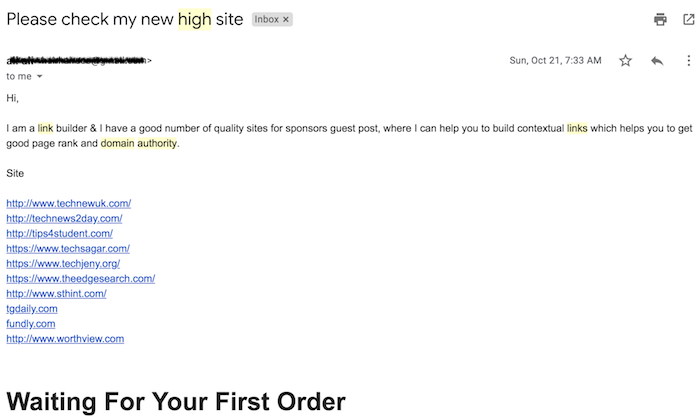
And they just don’t stop…
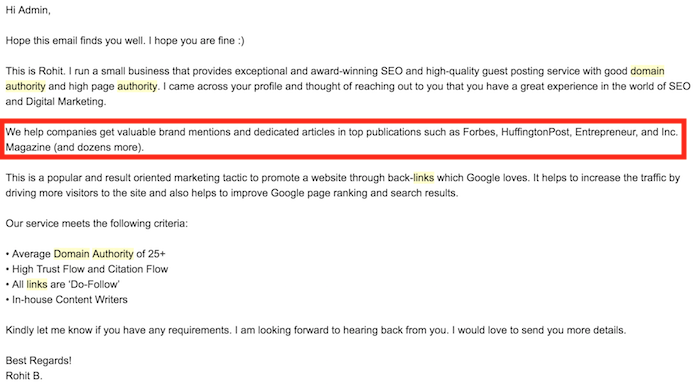
Nowadays, most of the big sites like Entrepreneur nofollow their links. But even if they didn’t, it isn’t hard to figure out which URLs and profiles on these sites are guest posts.
Just search for “guest writer” on Entrepreneur and you’ll find tons of articles like this.

By no means am I saying that the author above is selling links, I am saying that it isn’t hard for Google to spot these type of posts and devalue the links even if the publication decides to use do-follow links.
Heck, Google even commented on how links from Forbes were useless.
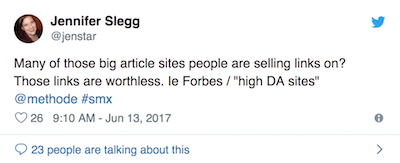
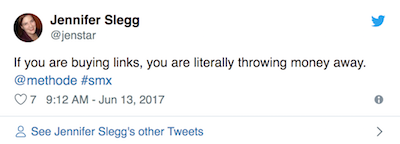
As Google commented…
Google devalues or ignores bad links, which reflects the changes we saw in Penguin, where Google devalues those links rather than penalizing for them.
If you want to build links through guest posts… especially obvious ones that clearly state the article was a guest post, don’t expect those links to have much of an impact on your search rankings.
Lesson #5: Google isn’t trying to take clicks away from your website, they are trying to build a better product
Over the last few years, I continually saw SEOs complaining about how Google is just trying to keep people on Google and not drive any traffic to their websites anymore.
Some of these marketers even claim it is unfair because they are just scraping content from your site and using it for their own benefit.
Let’s be honest here… none of you are going to block Google from crawling your site. You should be happy that you are getting traffic for free!
Who cares if Google scrapes your content… some free traffic is better than none.
It’s a big misconception that Google just wants to keep people on their own site. The real truth to this is that Google wants to do what is best for searchers, not marketers.
For example, one could say that they only care about ad revenue and they should blanket the page with ads… funny enough, though, over time they have reduced the number of ads per page by removing all sidebar ads.
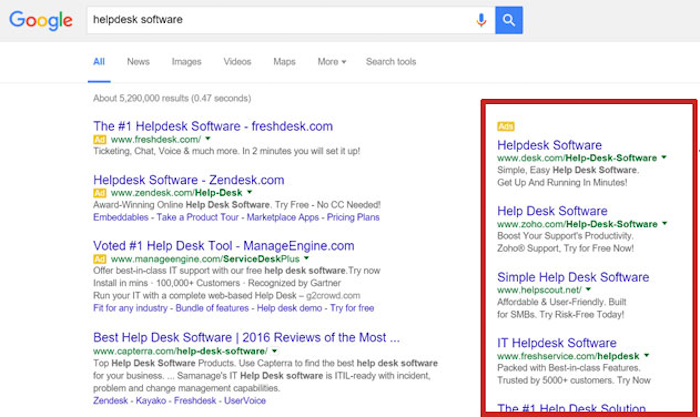
Yes, they are placing a few more ads at the top to make up for it, but overall it is still fewer ads per page.
I know many of you don’t like this, but they are a publicly traded company… they have to make money. And, ideally, more money each quarter.
Whether it is the knowledge graph or a mobile-first index, their goal is to do what is best for searchers. They know that if they do that their traffic will go up over time and a small portion of you will click on ads.
It really is that simple.
They don’t make these decisions based on what they want to do… they are logical engineers that use data.
For example, if 99% of their traffic said they hate knowledge graphs, there would be no knowledge graphs. Or if 99% of their users wanted more links per page going to external sites, then that is what they would add.
They do whatever you want, assuming you have the same opinion as of the masses.
The lesson to be learned here, don’t worry about Google taking your content or not driving as many clicks to organic results versus paid. You will constantly see changes coming, especially with the popularity of voice search. Know that these changes are based on data that the masses want.
Lesson #6: The biggest search opportunity currently lies in YouTube
Google loves text-based content. That’s part of the reason why so many companies have a blog.
But it isn’t as easy to rank on Google as it used to be… unless you expand internationally. But even that is getting more competitive as we speak.
The biggest opportunity in search is YouTube. According to Alexa, it is the second most popular site on the web and people tend to find their content on YouTube using the search feature.
If you aren’t convinced that you should start going after YouTube SEO, here are some interesting stats for you:
- YouTube has 1.9 billion monthly active users
- Only 50 million users are creating and sharing video content
- Average viewing session is 40 minutes
- Roughly 5 billion videos are watched per day
- Mobile devices account for 500 million daily video views
If that doesn’t convince you to go after YouTube, just look at my stats. I should have done it much sooner as the employee at Google pushed me to create videos years ago but I was a bit slow to move on their advice.
And now I am generating 724,464 views a month:
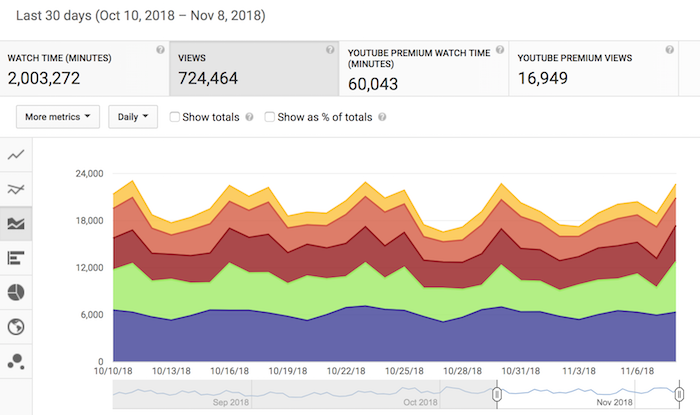
Of which 185,290 comes from YouTube search:
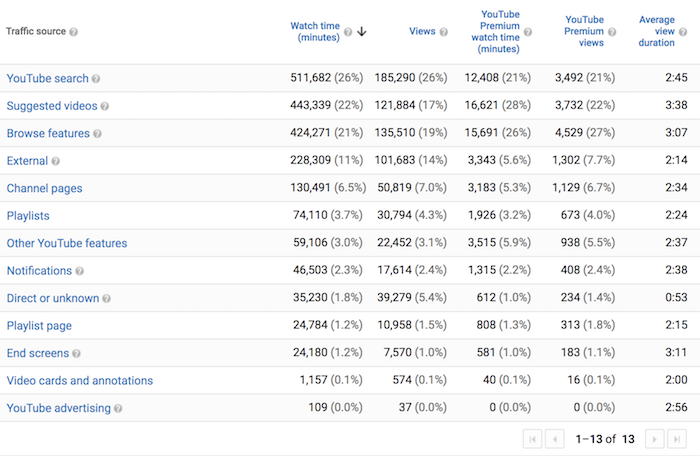
How many of you can say your website is generating over 100,000 visitors a month from Google?
That’s the power of YouTube… it has volume and it is easier to rank than on Google. Just look at me, I generated over 100,000 views a month in less than a year from YouTube SEO.
Lesson #7: You are not going to like the future
I saved the biggest lesson for last because it affects most marketers who are used to Google in its current form and how it has been for years.
From all of my conversations with people who work at Google, they all know the world is changing and they want to make sure Google adapts with it and, more importantly, stays ahead.
For example, they know a lot of searches are going through voice devices like Alexa and Google Home. If you just look at mobile devices, voice already accounts for 20% of the searches.
And it is happening at a rapid pace based on the graph below:
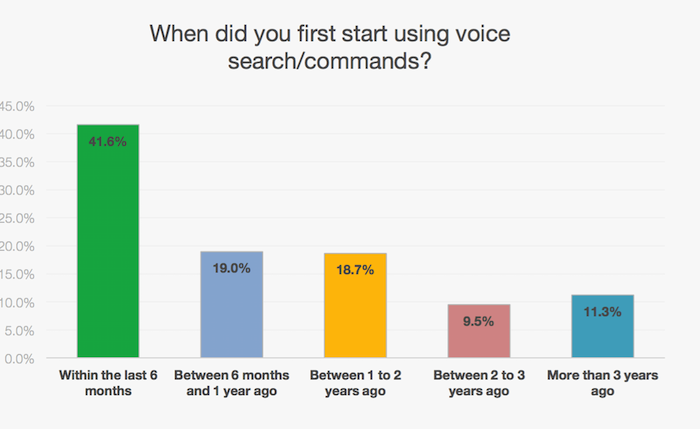
And it isn’t stopping there. Both the Internet world and the real world are starting to be connected.
From self-driving cars, which Google has spent billions of dollars on, to simpler things you use every day that Google is starting to connect with (like your stove and fridge).
They want to control it all. And not in a creepy way, more so in a way that makes your life easier.
For example, if you are cooking and are unsure about a recipe, they want to be there to make sure that you are doing everything correctly.
As for what it will look like in the future, no one knows yet, not even Google. But they are paying smart product people and engineers to solve these problems. For example, they know that kids aren’t using Google search the same way adults are.
A good example of this is when my 8-year-old nephew isn’t sure about something, he asks Alexa. I, on the other hand, will perform a search on my laptop.
All we can do here is make sure that we adapt with technology to ensure that we keep getting traffic from Google. This doesn’t mean to just adapt your SEO strategy but more so to adapt your business and ensure that you are staying on top of things and providing users with what they want.
Conclusion
As SEOs, we continually try and play a game of cat and mouse. But why?
Instead of wasting our time on short-term thinking, why not start putting yourself in your customers’ shoes?
That’s what Google is doing. And the changes they are making to their search engine, their future product roadmap, and even to their algorithm are based on what people want.
If you want to continually do well, yes you still need to do traditional SEO. But you need to start thinking about your end user and do what’s best for them.
So, what’s your SEO game plan now?
No comments:
Post a Comment